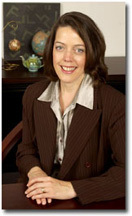
The reaction of the United States to the Sept. 11, 2001, terrorist attacks, particularly the authorization of torture and secret detention, has greatly depleted the power of already strained international institutions, and Mary Ellen OConnell would like to do something about that.
In her new book,The Power and Purpose of International Law,published by Oxford University Press, OConnell, Robert and Marion Short Professor of Law at Notre Dame, opposes the recently revived arguments about the impotence of international law and its inapplicability to the United States.
After 9/11, top U.S. government lawyers developed legal arguments to justify torture and coercion of detainees during interrogation,OConnell said.These lawyers could draw on an anti-international law tradition dating back centuries that denigrates international law for its lack of enforcement means.
According to OConnell, her book attempts to address themyths and misinformationon which those arguments depend and to demonstrate that respect of international law is in the national interest of the United States no less than of the worlds other nations.
In fact international law has means of enforcement, but, more importantly, it is accepted by the international community as law,OConnell said.Acceptance and enforcement together support the claim that international law is law. With this acceptance, international law has the capacity to support the common aspirations of all humanity, aspirations for peace, prosperity, respect for human rights and preservation of the natural environment.
According to one early reviewer, Thomas Franck, Becker Professor of Law Emeritus at New York University School of Law, O’Connells bookadds her fresh views and clear-eyed vision to the battle to have America take international law seriously. Concomitantly, her message points to the way a new administration in Washington could hope to have the world take America’s leadership seriously.
Another reviewer, Vaughn Lowe, Chichele Professor of Public International Law at Oxford Universitys All Souls College, called the booka brave, and sadly necessary, affirmation that the rule of law is an essential precondition for civilized life, even in nations whose leaders may think that they have no immediate need for it.
OConnell joined the Notre Dame law faculty in 2005.Her scholarship and teaching largely concern the enforcement of international law and the promise of a classical revival in international law.
_ Contact: Professor OConnell at 574-631-7953 or_ " MaryEllenOConnell@nd.edu ":mailto:MaryEllenOConnell@nd.edu
TopicID: 29388